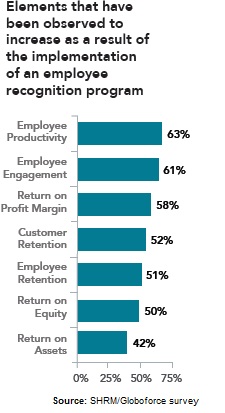![]() Employee engagement ranks high on the list of human resource challenges, yet fewer than half the companies in a survey by SHRM and Globoforce said they track it.
Employee engagement ranks high on the list of human resource challenges, yet fewer than half the companies in a survey by SHRM and Globoforce said they track it.
Of those that do, more of their HR professionals say workers are rewarded according to their performance, that managers are effective in acknowledging and appreciating employees, and employees are satisfied with the level of recognition they get.
These are some of the findings of a twice-yearly survey conducted by the Society for Human Resource Management in collaboration with employee recognition vendor, Globoforce. The most recent survey looked at:
- What engagement practices and strategies are implemented in today’s leading companies.
- How the alignment of company core values with employee recognition impacts engagement
and appreciation levels. - What HR strategies are most effective in delivering maximum return on investment and bottom-line results.
Although engagement ranked highest on the list of concerns among the 770 HR leaders who participated, performance management and retention were close behind. Effective performance management was a particular concern, as only 55 percent agreed that the usual annual reviews are an accurate appraisal. That’s down five points from the 61 percent who said that in the June survey.
In a section headed “Performance Management Remains Stuck in Neutral,” the report says, “Conducting ongoing performance assessments with real-time feedback remains an opportunity for companies to manage and improve engagement, motivation, and productivity throughout the year.”
Formal recognition programs, notes the report, add value by “providing a new wisdom of crowds approach to performance reviews.”
 “Through a more frequent and informal assessment in the form of recognition from managers and peers alike, managers and employees both gain a more collective approach to feedback. This results in higher levels of employee engagement and appreciation due to more fairness and transparency,” says the report.
“Through a more frequent and informal assessment in the form of recognition from managers and peers alike, managers and employees both gain a more collective approach to feedback. This results in higher levels of employee engagement and appreciation due to more fairness and transparency,” says the report.
HR leaders at the 76 percent of companies with a formal recognition program in place reported the same kind of results as did those where employee engagement was tracked: they said their employees were satisfied with their level of recognition for a job well done; thought managers and supervisors effectively acknowledged employees; and, that employees are rewarded according to performance. Those respondents at companies without a recognition program agreed with each of those statements at much lower rates.
While only 15 percent of the responding leaders track the return on investment of their recognition program, the majority of those who do say they have observed increases in productivity, engagement, return on profit margins, and employee and customer retention.
From the survey, the report details these conclusions:
- Engagement continues to be the top HR challenge. However, only a minority of companies actively make it an active part of their HR program. The majority are missing out on higher employee satisfaction levels.
- Traditional performance management processes are still keeping HR professionals behind. The once-a-year review lacks the ongoing feedback mechanism that employees crave.
- Employee recognition fills this feedback need by providing a new wisdom of crowds approach to performance reviews.
- Recognition helps HR leaders justify its cost by making a quantifiable impact on key business metrics.
- Aligning recognition with core values helps managers be more effective by showing them the right way to appreciate employees’ work and reinforce desired behaviors.